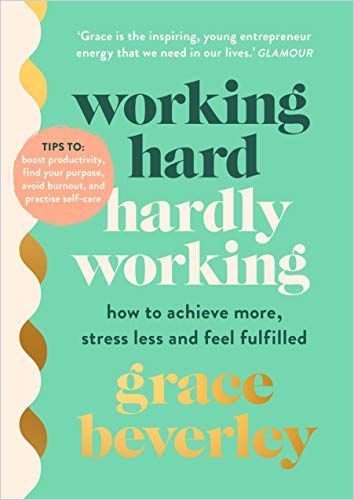Social media influencer Grace Beverley offers advice on time management, productive mind-sets, setting goals and giving yourself a break.

Advice for Millennials and Gen Zers
In this Sunday Times #1 bestseller, social media influencer Grace Beverley (GraceFitUK) tells readers how she believed growing her career would catapult her into adulthood and give her fulfillment. But working long hours and weekends made her neither happy nor healthy. Beverley challenges conceptions of success and productivity dominant among gen Zers and millennials, and encourages readers to take a more humane and sustainable approach to their careers. She offers tips for avoiding burnout, finding balance, working smarter and designing the life of your dreams.
Cosmopolitan said Beverley “offers a fresh take on how to create your own balance, be more productive and feel fulfilled in the high-pressure social media age.” Some readers, however, found Beverley’s style belabored and repetitive, and felt her text could use more editing. Others complained about Beverley preaching about work-life balance when her upbringing and education suggest the protection of considerable privilege.
Hustle Culture
Beverley begins by speaking directly to her intended audience. Millennials and and people of the gen Z generation, she says, hold unsustainable conceptions of what work should look like. She finds their perspectives are warped by comparisons to their peers on social media as well as unrealistic film and television depictions of working life. The generation entering the workforce today must accept that prior generations’ template for success – work hard, become a homeowner, retire with a paid mortgage and savings – no longer works for most.
There is a social-media-shaped fingerprint on the surface of how we see most things – everything from hustle to self-care to success and self-worth – and we are part of a generation that exists predominantly within an environment of hyper-comparison.Grace Beverley
Beverley thinks that people mistakenly believe that tethering themselves to a singular purpose, and making the work they perform in the name of this purpose central to their very identity, is the ultimate goal. The author finds this toxic, and differentiates between purpose and self-actualizing.
Time Blocking
Beverley suggests learning time management by labeling tasks as urgent or important. If they’re neither, don’t worry about them. Her method: Something is a “task” if it demands a half hour or more.
Deep work is all about accepting that we will be bombarded from all sides by notifications and instant distractions, and that it’s our job to combat that and protect our space when we need to.Grace Beverley
Like every other contemporary author who writes about time management, Beverley recommends building a schedule and noting that, for example, if you’re most creative first thing in the morning, you should time block your creative tasks for that time.
Beverley suggests pursuing your version of success by setting specific, measurable, realistic, relevant goals – for example, reading 10 pages of a book every day. Setting goals prompts you to achieve what she calls a success mind-set – when you describe things you will do, feel or experience in the future, in writing, and with conviction.
The author wants you to move away from a self-critical mind-set – the feeling that you don’t deserve success – toward a self-accountability mind-set, by changing the way you talk to yourself. As an example, rather than fixating on how your mistakes are all your fault, Beverley asks: Why not reflect on the patterns that caused your mistakes, and set goals to change those patterns?
Beverley describes the unhealthy ways in which people engage in “hustle signaling” on social media – validating their own productivity so others view them as hardworking and diligent. She insists that equating working long hours at an unsustainable pace with productivity is harmful and unproductive.
Much like the efforts of social media on our body image, we need to start a conversation about our productivity image.Grace Beverley
Humans are not machines – yet people tend to value themselves primarily for their output, and feel like failures when they don’t work at maximum capacity all the time. Pay attention to your needs, she reminds you, and understand that your capacity will change daily. Regard self-care as a form of productivity, and to balance your needs with working hard.
Priorities
Beverley advises reflecting on five things you spend the most time doing. Consider whether you’d like to add anything to that list. Does how you spend your time align with your goals, or someone else’s?
It’s not about having it all, it’s about knowing what you want and when you want it and learning how to harness the merits of productivity and self-care alike – understanding you cannot have one without the other.Grace Beverley
Beverley urges you to find out how self-sabotage might create boundaries for yourself. Ignoring the hard realities of working people with less leisure time, she exhorts you to align your time with your broader life goals.
Self-Care and Self-Worth
Beverley recognizes the temptation to internalize that taking a day off is shameful. She argues that failing to respect your limits reduces the quality of your work. As a not-all-that-original alternative, she recommends engaging in self-care that feeds your needs more than your wants.
You have to handle self-care with care – in the same way that we’re not productivity machines, we’re not self-care machines.Grace Beverley
Reflect on your place on the introversion or extroversion scale. List what makes you feel good and bad. Balance hinges on developing self-awareness. And Beverley returns to her oft-repeated theme: Success and growth emerge from self-accountability, belief in your self-worth, and the acceptance and love you deserve.
Derivative
In this derivative, unoriginal work, Beverley offers a mélange from contemporary self-help books. Her ingredients include well-worn advice on managing your time, being more generous to yourself, working less hard and setting personal goals. She presents this with a breathless, goop-style earnestness. Her long, run-on sentences are hard to follow and try the reader’s patience. Those sentences and the superficiality of her advice paint an unattractive portrait of someone too much in love with her own voice to bother making her book enjoyable to read or actually helpful. Beverley writes much like a marketing person who became a social media influencer. Perhaps the positive reviews this work garnered speak to its offering one-stop-shopping for every current self-help cliché.
Worthy works offering alternative views on success and career include Lauren McGoodwin’s Power Moves, Jim Loehr and Tony Schwartz’s The Power of Full Engagement, and Matthew Kelly’s Off Balance.













